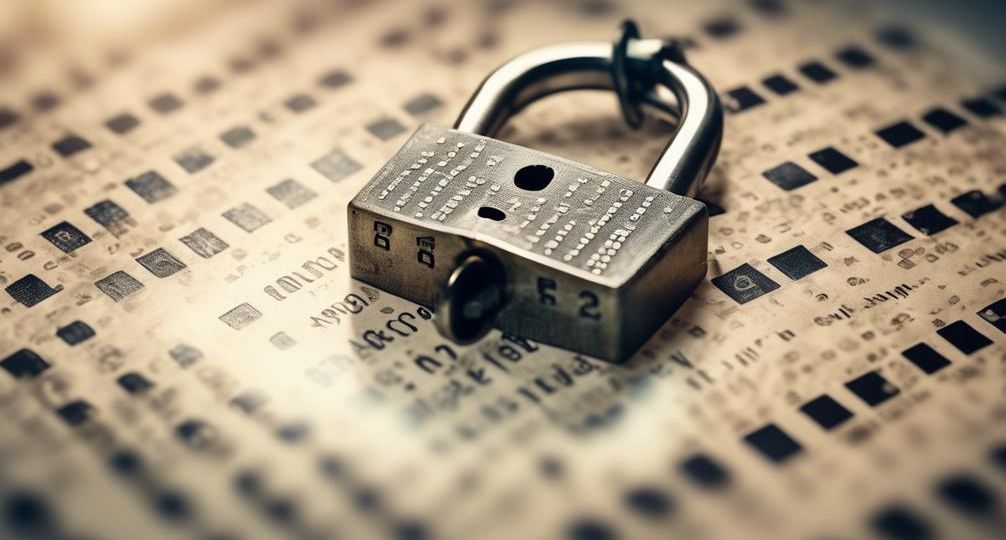
Is Telegram 100% safe?
You download it, you use it, you trust it – but is Telegram really 100% safe?
As a globally popular messaging app, Telegram touts itself as a secure platform for communication, boasting features like end-to-end encryption and self-destructing messages.
Yet, it’s not without its controversies and questions regarding its absolute security.
So, let’s explore this digital enigma together, assessing its security protocols, examining any past incidents of data breaches, and comparing it with other popular messaging apps.
In the end, you might find yourself re-evaluating what it means to be ‘secure’ in the digital world.
Key Takeaways
- Telegram’s infrastructure and encryption provide secure storage and protection for user data, making it difficult for hackers to infiltrate.
- Self-destructing messages and secret chats with end-to-end encryption enhance privacy and minimize the risk of unauthorized access.
- Regular chats in Telegram are server-client encrypted, with the possibility of access by Telegram if necessary, and multi-device access increases the risk.
- Two-step verification is an important security measure that enhances user authentication and protects the Telegram account.
Understanding Telegram’s Infrastructure

To fully grasp how secure Telegram is, you’ve got to delve into the nuts and bolts of its infrastructure. The heart of this infrastructure lies in Telegram’s cloud storage and decentralized servers.
Telegram’s cloud storage is a game-changer in the realm of data security. Unlike other messaging apps that store data on your device, Telegram securely houses your messages, media, and files on a cloud server. This means that even if you lose your device, your data remains intact, accessible from any other device. It’s a smart, innovative solution that ensures the longevity and safety of your data.
The next innovation is the use of decentralized servers. Traditional servers are centralized, forming a single point of failure. If attacked, all data gets compromised. Telegram, however, uses multiple servers, located worldwide. This decentralization makes it incredibly difficult for hackers to infiltrate. Even if they manage to breach one server, the others remain untouched, keeping your data safe.
To conclude, Telegram’s cloud storage and decentralized servers work in tandem, creating a fortress of security. So, when you’re considering safety in messaging apps, remember, Telegram has you covered.
Encryption: The Foundation of Safety
While Telegram’s cloud storage and decentralized servers offer robust protection, it’s the app’s encryption methods that truly lay the foundation for your data’s safety. Telegram employs a complex network of encryption algorithms, ensuring your messages remain secure from prying eyes. This is critical for your privacy implications, as the encryption methods protect not only the content of your messages but also your personal information.
To delve deeper into the architecture of Telegram’s encryption, let’s break down the key components:
- Symmetric encryption: This is the basic level of encryption, where the same key is used for encryption and decryption.
- AES-256: Telegram uses the Advanced Encryption Standard (AES) with a 256-bit key, providing a higher level of security.
- Asymmetric encryption: This involves two keys – a public key for encryption and a private key for decryption.
- RSA-2048: Telegram incorporates RSA encryption with a key size of 2048 bits, making it virtually impossible to break.
- Secure Hash Algorithm: It’s used for message authentication, ensuring the integrity of your messages.
- SHA-256: This algorithm produces a unique hash value for each message, detecting any unauthorized changes.
This encryption framework ensures Telegram’s commitment to securing your data and respecting your privacy.
Self-Destructing Messages Feature

Beyond the intricate encryption methods, Telegram also offers a unique feature of self-destructing messages, enhancing user privacy and data security even further. This feature allows you to set a message lifespan, controlling how long a sent message remains visible before it disappears. The destruction timing, once set, is irreversible, ensuring that your sensitive information doesn’t linger longer than necessary.
This feature is particularly beneficial in situations where you need to share sensitive information. You can set a short lifespan for these messages, minimizing the risk of unauthorized access. Even if someone can bypass Telegram’s robust encryption, they’ll have to contend with the timing of the self-destruction, significantly reducing the window of potential exposure.
However, it’s crucial to understand that the self-destructing messages feature doesn’t necessarily guarantee absolute security. For instance, the recipient can still take screenshots of the conversation. Therefore, while it’s an innovative and useful tool for enhancing privacy, it’s not foolproof.
Secret Chats Vs Regular Chats
Unraveling the distinctions between Telegram’s regular chats and secret chats is your next step in comprehending the platform’s security.
You’ll need to understand the basic functions of regular chats before examining the more covert features of secret chats.
Drawing a comparison of their security attributes will further illuminate where each type excels and where potential vulnerabilities may lie.
Understanding Regular Chats
Diving into the realm of Telegram’s messaging, it’s crucial to distinguish between its two key features: regular chats and secret chats.
Regular chats on Telegram are cloud-based and offer a plethora of customization options, enhancing your chat experience.
- Chat Customization:
- You can change chat backgrounds, use stickers, and even customize your emojis to inject personality into your conversations.
- You can enable or disable message previews for added privacy.
- Profile Privacy:
- Your profile visibility can be adjusted according to your comfort level.
- You can limit who can see your last seen and profile photo, maintaining control over your digital footprint.
In essence, regular chats aren’t just about sending messages; they’re about creating a user-centric, personalized experience while respecting your privacy.
Exploring Secret Chats
In your journey with Telegram, you’ll come across another feature known as secret chats, which are designed to provide an even greater level of security compared to regular chats.
In secret chats, your messages are end-to-end encrypted and can self-destruct after a set time, like in an incognito mode.
Unlike regular chats, secret chats don’t allow forwarding and aren’t part of chat backups.
It’s a one-device experience, which means they’re only accessible from their initiating device.
This sophisticated, security-first design means that even if a hacker bypasses Telegram’s encryption, they can’t access your secret chat data from the cloud because it simply isn’t there.
It’s this innovative approach that sets Telegram apart in the realm of secure messaging platforms.
Security Features Comparison
While you’re getting the hang of Telegram, it’s crucial to understand how the security features differ between secret chats and regular chats.
Secret chats offer superior privacy settings, including:
- Self-destructing messages: You have the power to decide how long messages should last before they disappear.
- End-to-end encryption: Only you and the recipient can read the messages, not even Telegram.
On the other hand, regular chats are more straightforward but lack user authentication. Their features include:
- Server-client encryption: Messages are safe, but Telegram can access them if needed.
- Multi-device access: You can access your chats on any device, but it also increases the risk.
Two-Step Verification Process
You might be wondering about the importance of Telegram’s two-step verification process and how it enhances security.
It’s a critical factor to consider; when set up correctly, it can significantly bolster your account’s protection.
Let’s take a closer look at how this process works and the unique security benefits it offers.
Importance of Verification Process
To bolster the security of your Telegram account, it’s crucial to understand and implement the two-step verification process. It’s not a mere formality but an essential part of user authentication. The verification’s importance is threefold:
- It strengthens your account security, reducing the risk of unauthorized access.
- By requiring two forms of identification, it’s harder for intruders to breach your account.
- It provides an extra layer of protection, even if your password is compromised.
The second step, usually a unique and time-sensitive code, deters hackers. It validates your identity, ensuring you’re the legitimate account holder. This is particularly vital when dealing with sensitive information or conducting important conversations.
Embracing this innovation not only fortifies your Telegram account but also enhances your overall digital security landscape.
Enhancing Telegram’s Security
Implementing Telegram’s two-step verification process significantly bolsters your account’s security, making it a formidable fortress against potential cyber threats. By setting passcodes and backing up your personal data, you add an extra layer of security that’s critical in today’s digital landscape.
Here’s a quick guide to enhancing your security:
| Action | Steps | Outcome |
|---|---|---|
| Setting Passcodes | Go to ‘Privacy and Security’ > ‘Two-Step Verification’ | Second layer of security |
| Personal Data Backup | Go to ‘Settings’ > ‘Data and Storage’ > ‘Data Export’ | Safeguard personal data |
| Regular Updates | Keep Telegram app updated | Latest security patches |
This process may seem technical, but it’s crucial for comprehensive security. It’s not just about innovation, but also about maintaining control over your data while staying ahead of evolving cyber threats.
Vulnerabilities in Telegram’s Security

Despite its strong reputation for privacy, Telegram isn’t without its security vulnerabilities. You may question Telegram’s backdoor access and demand greater security policy transparency. It’s crucial to understand the potential loopholes that might compromise your data safety.
- Encryption Concerns: Telegram uses a home-grown encryption protocol – MTProto. Although it provides secure communication, it’s not without criticisms. Some cyber-security experts argue that Telegram’s encryption isn’t as secure as perceived due to its proprietary nature.
- Data Storage: Telegram stores your data on its servers. If Telegram’s servers are compromised, your data might be at risk.
- Backdoor Access: Telegram’s backdoor access is a contentious issue. Despite assurances, the possibility of government agencies accessing your data can’t be entirely ruled out.
Although Telegram’s security is robust compared to many messaging apps, it’s not impervious to cyber threats. Security policy transparency is also an area that needs improvement. Remember, no platform can guarantee 100% security. You must employ additional measures like enabling two-step verification, not clicking on suspicious links, and regularly updating your app to ensure your data remains secure on Telegram.
Data Leaks: Past Incidents
Occasionally, even the most secure platforms like Telegram have faced data leak incidents which are worth examining in detail. In 2020, a massive breach exposed the personal data of millions of users, a stark reminder of the data breach consequences. Hackers exploited a vulnerability, gaining access to phone numbers and user IDs. This incident underlines the stark reality: no system is impervious, and the need for continuous innovation in security robustness is essential.
The aftermath of this breach was serious. People’s identities were at risk, causing significant distress among the user community. Yet, it catalyzed Telegram to implement stronger protective measures. The company has since introduced more stringent privacy protocols, such as two-step verification and secret chats that leave no trace on the servers.
These improvements show Telegram’s commitment to securing user data. However, it’s also a call to arms for you as a user. You must stay vigilant, update your apps regularly and use the security features provided. Remember, the digital world is a battleground, and you’re part of the front line defense against data leaks. With collective effort and innovative solutions, we can minimize the risks and make Telegram safer.
Comparison With Other Messaging Apps

To evaluate Telegram’s safety, it’s essential to compare it with other popular messaging apps.
Consider how Telegram stacks up against WhatsApp in terms of security features and encryption methods.
Examine the comparison between Telegram and Signal, as well as Viber, to gain a comprehensive understanding of Telegram’s position in the messaging app landscape.
Telegram Versus WhatsApp Safety
When comparing the safety features of Telegram and WhatsApp, two of the most popular messaging apps, you’ll find key differences that could significantly impact your choice.
Both apps have their strengths, but data privacy concerns and Telegram’s legal policies might sway you.
Consider these aspects:
- Telegram offers end-to-end encryption for secret chats, while WhatsApp provides it for all conversations.
- However, Telegram’s server-side encryption has been criticized for potential vulnerabilities.
- Regarding data privacy, WhatsApp shares user data with Facebook. Telegram, on the other hand, promises not to share data with third parties.
- Yet, Telegram’s legal policies have a provision to cooperate with security agencies if necessary.
- Both apps provide two-step verification, but Telegram’s secretive chat function adds an extra layer of security.
You should weigh these factors carefully before making your choice.
Comparing Telegram and Signal
Diving into another comparison, let’s examine Telegram and Signal, another messaging app renowned for its strict privacy measures and secure communication features.
Signal’s privacy policies are widely applauded since they collect minimal data, essentially only your phone number. This is a stark contrast to Telegram, which has been marred by data breaches, exposing user’s sensitive information.
While Telegram’s cloud-based system allows for easy access across devices, it’s this very feature that has raised security concerns. Signal, on the other hand, offers end-to-end encryption for all communications, providing a more secure platform.
Viber and Telegram’s Security
Continuing the exploration of messaging app security, let’s shift our focus to Viber and examine how it squares off against Telegram in terms of safeguarding user data.
Both platforms boast cross-platform compatibility and user-friendly interfaces, but how do they compare in the realm of security?
- Encryption: Both Viber and Telegram use end-to-end encryption. However, Telegram’s encryption is only active in ‘secret chats’, whereas Viber’s is always on.
- User Control: Telegram offers more user control over data privacy.
- Server Storage: Unlike Viber, Telegram stores data on their servers, which could be a potential risk.
Tips to Enhance Telegram Security

To bolster your Telegram security, there are several practical steps you can take. Locking down your privacy settings is a prime directive. By doing this, you ensure that only authorized users can see your personal information, such as last seen status and profile photos. Another crucial step is undertaking profile authenticity checks. This involves verifying that contacts are who they claim to be, which reduces the risk of scams and identity theft.
Here’s a table that illustrates more ways to enhance your Telegram security:
| Security Tips | Description |
|---|---|
| Two-step Verification | Adds an extra layer of security by requiring a password besides the SMS code. |
| Secret Chats | Employs end-to-end encryption, making it impossible for anyone else to read your messages. |
| Self-Destruct Timer | Allows you to set a timer for messages to self-delete after being read. |
| Limiting Forwarded Messages | Prevents your messages from being forwarded by others. |
| Blocking Unknown Contacts | Stops strangers from contacting you or viewing your profile. |
Evaluating Telegram’s Overall Safety
When it comes to assessing Telegram’s overall safety, you’ll find that it’s built upon a foundation of robust security features, but understanding its strengths and weaknesses is crucial for a comprehensive evaluation.
Let’s delve deeper into these aspects:
- Telegram’s Privacy Policy: This document outlines how Telegram handles your data. It’s central to the platform’s safety measures. The policy provides:
- Transparency: You know exactly what data is being collected.
- Control: You’re in charge of your own information.
- User Information Collection: Telegram collects less data compared to other popular messaging apps. This aspect consists of:
- Minimal Data Collection: Telegram only collects necessary data.
- No Third-Party Sharing: Your data isn’t shared with advertisers.
However, no system is impervious. Here are some concerns:
- Encryption: While Telegram offers end-to-end encryption, it’s not enabled by default.
- Manual Activation Required: This extra step might be overlooked by users.
- Cloud Storage: Your messages are stored on Telegram’s servers, potentially exposing them to hacks.

